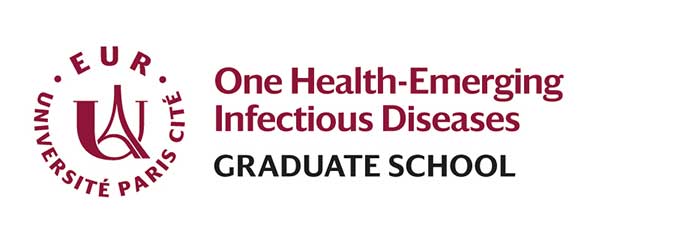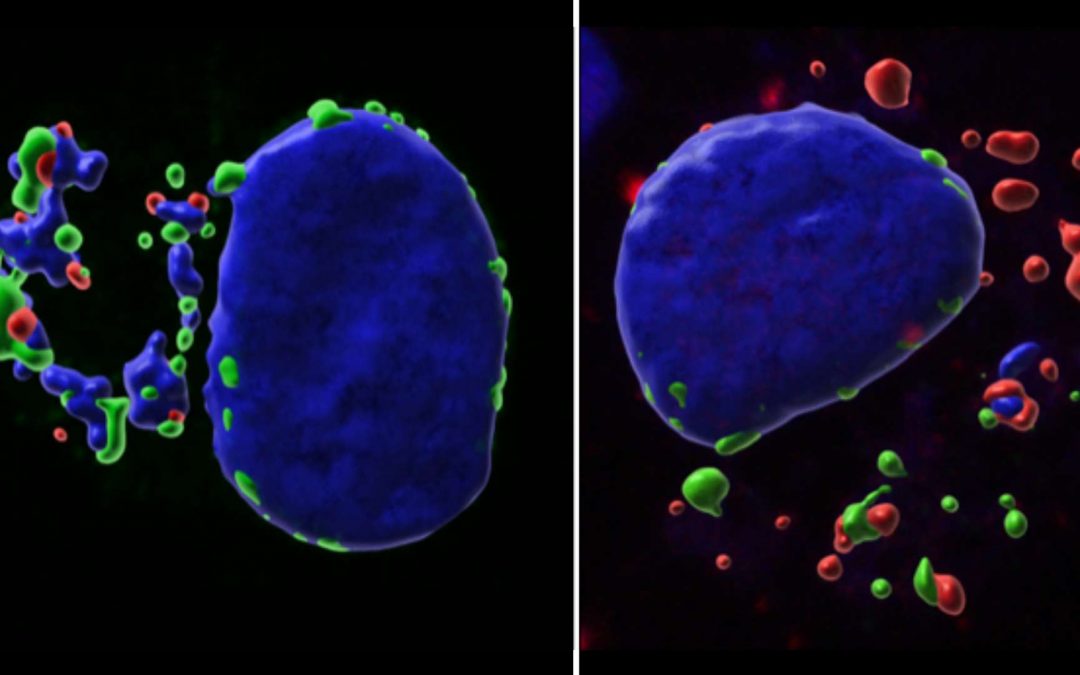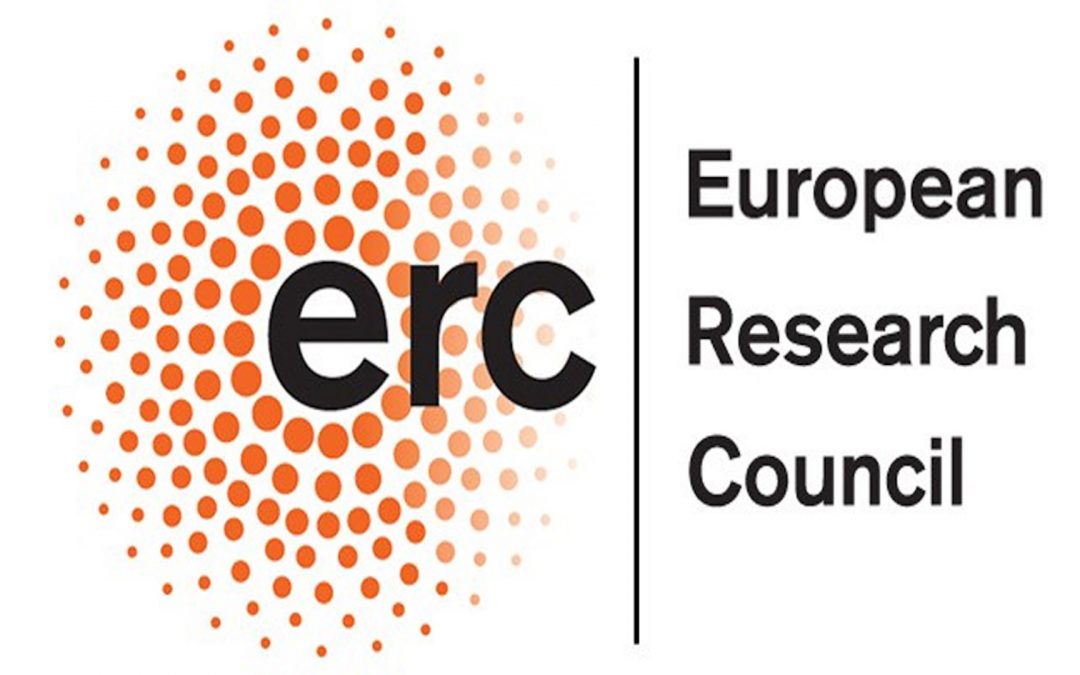One Health-Emerging Infectious Diseases
Laureate of the call for expressions of interest “Future skills and professions 2022” – financed by the “France 2030” investment plan – the Graduate School of One Health-Emerging Infectious Diseases (1H-EID) aims to create a complete training programme specifically dedicated to (re)emerging infectious diseases.


Presentation
The Graduate of One Health Emerging Infectious Diseases offers a multidisciplinary educational programme of excellence, based on research. The aim is to create a community of scientists and health professionals, but also decision-makers sharing: the same vocabulary, networks and comprehension of health, societal and economic challenges that the emerging infectious diseases represent. This Graduate School of One Health Emerging Infectious Diseases involves the Faculties of Health, of Sciences, and of Societies and Humanities of Université Paris Cité, as well as the Institut physique du globe de Paris. The Institut Pasteur, the National Veterinary School of Alfort (EnvA) and Sorbonne University also participate in this project.
Early detection and preparation to epidemics of emerging infectious diseases are essential to the reactive implementation of effective measures to reduce their impact. An educational programme of excellence in the field of (re)emerging pathogens is the key to raise the major challenges that future generations will face.
Current educational programmes on emerging infectious diseases are very divided between the different fields, blocking the implementation of a real approach of “One Health”. The Graduate School of One Health-Emerging Infectious Diseases offers a multidisciplinary vision on global health with an Emerging Infectious Diseases Master course (MIE), a PhD programme and continuing education. Students from different and diverse backgrounds – medicine, pharmacy, science, veterinary and engineering schools – follow a transdisciplinary programme which offers an education in in the biology of emerging pathogens, epidemiology, veterinary science, ecology, evolutionary biology and socio-anthropology.
Contact
For more information about the Graduate School:
Project Manager
Anvita BHARGAVA
anvita.bhargava@u-paris.fr
Education Coordinators:
Faculty of Sciences
Isabelle MARTIN-VERSTRAETE
Faculty of Health
Solen KERNÉIS
For more information about the Master Molecular and Cellular Biology – Emerging Infectious Diseases course:
India LECLERCQ
Sandie MUNIER
Naïm OULDALI
Hélène PERE
Scholarships
[In process] Call for PhD proposals
The Graduate School of One Health-Emerging Infectious Diseases awards PhD fellowships of a duration of 3 years, to French or international students. The call for 2024-2025 academic year will be open from March 1st, 2024 to April 30th, 2024 at 12:00 CET, for a contract commencement on October 1st, 2024. The candidate and the thesis supervisor must jointly apply with a project proposal.
Download the application form >
SMARTS-UP Graduate Schools mobility scholarships
The Graduate School of One Health-Emerging Infectious Diseases is pleased to announce the availability of competitive mobility scholarships for students as part of the Molecular and Cellular Biology Master’s program in emerging infectious diseases. These scholarships are designed to facilitate student mobility both internationally and between overseas locations and France.
Meetings
Anvita BHARGAVA interviewed Dr. Anthony FAUCI on behalf of the Graduate School of One Health – Emerging Infectious Diseases and Institut Pasteur. Dr. Anthony FAUCI addresses critical questions about the training future scientists should receive to tackle the next pandemic. He emphasises the importance of collaboration between different disciplines and the value of partnerships between academia and industry. In addition, he highlights the need to train scientists regarding socio-economic challenges and effective communication with the general public. The end goal is to guide decision-makers towards optimal public health outcomes.
Masters
Within Master Molecular and Cellular Biology (BMC), a course is open in Master 1 and 2 in September 2023
In Master 1, the Emerging Infectious Diseases (MIE) course includes – in addition to existing courses in molecular biology, cell biology, bioinformatics, virology and microbiology – new classes in computational biology, ecology and “One Health”. Internships in emerging infectious diseases are organised in laboratories associated with the Graduate School of One Health-Emerging Infectious Diseases.
For students in the field of health, Introductory Research Courses (PIR) in the area of infectious diseases or public health is propose: “Resistance and adaptation of microorganisms to anti-infectives”, “Evolutions: main mechanisms – biological and medical approaches” and a new course “Emerging infectious diseases”.
Information webinar regarding the MIE course for the M1 :
- Wednesday, March 6th 2024 at 17:00 CET
- Free participation without pre-registration
- The webinar can be accessed here
Meeting ID: 832 8664 0278
Code : 712505
In Master 2 Molecular and Cellular Biology – Emerging Infectious Diseases courses (MIE), students have a common module “One Health, an interdisciplinary approach” then one of the following majors can be chosen: biology of emerging pathogens or epidemiology and biostatistics. The course is completed either with the other major or with one of these three minors – Human-Animal-Environment Interface, Evolutionary Dynamics or Human and Social Sciences – and by additional modules of their choice (“From the Field”, innovation, vaccines, monoclonal antibodies, ecology, circulation of infectious agents and risk control, antibiotic resistance, infection modelling, surveillance or global health, etc.).
Customised Master 2 internships highly encouraging multidisciplinarity – two internships, interface project, internship and tutored project – rely on the diversity of the laboratories of excellence affiliated to the Graduate School of One Health-Emerging Infectious Diseases, offering a unique environment to combine fundamental and translational research in: virology, microbiology, epidemiology and modelling, social sciences
Information webinar regarding the MIE course for the M2 :
- Monday, April 22nd 2024 at 17:00 CET
- Free participation without pre-registration
- The webinar can be accessed here
Meeting ID: 881 2324 1015
Code : 703416
Research
Doctoral schools
The Graduate School of One Health-Emerging Infectious Diseases provide a doctoral programme with opportunities for dissertation scholarships, end-of-doctorate scholarships, short-term funding for international mobility scholarships or for conferences.
The five doctoral schools (DS) associated with the Graduate School of One Health-Emerging Infectious Diseases are:
For the PhD pathway, a wide range of modules in the disciplines covered by the Graduate School of One Health-Emerging Infectious Diseases in English or French is offered.
Modules taught in French:
- Bioinformatics
- Circulation of infectious agents and risk control
- Creation and management of databases
- Emerging infectious animal diseases and zoonosis
- Ethics in research
- Evaluation of diagnostic tests
- Generalized linear models
- Insect vectors and pathogen transmission
- Introduction to risk analysis
- Introduction to the relationship between science and society
- Medico-economic analysis
- Modelling of infectious diseases
- Public health surveillance, global health
- R programming and statistics
- Retroviruses
- Viruses and cancer
- Statistical analysis of infectious disease data
Modules taught in English:
- Analysis of high dimensional data
- Emerging pathogens
- From the field
- Genomic and evolutionary dynamic
- Global health security, risks and memories
- Host-emerging pathogen interaction
- Innovation and EID
Some of the Institut Pasteur’s MOOCs can be taken as modules of the Graduate School of One Health-Emerging Infectious Diseases: (re)emerging viruses, HIV, human viruses and cancers, vaccinology, medical entomology, resistance to antibacterial agents, malaria, innate immunity, tuberculosis, viral hepatitis, biobanking, clinical trials on infectious and tropical diseases, modelling of infectious diseases, medical mycology, waterborne infectious diseases, rabies, malaria.
Laboratories
The Graduate School of One Health-Emerging Infectious Diseases is based on a very broad network of institutes and laboratories in the fields of infectious diseases, public health and human and social sciences at Université Paris Cité, Institut Pasteur, Sorbonne University and the National Veterinary School of Alfort (EnvA). It benefits from the Microb’UP Institut hors-murs, which federate the community interested in microbiology, virology and infectious diseases within Université Paris Cité.
The Graduate School of One Health-Emerging Infectious Diseases benefit from the complementary skills in terms of zoonosis and ecology of the research teams of the EnvA and Sorbonne University. This community with very diverse skills allow the creation of transdisciplinary projects and a strong dynamic for training through research for Master’s students and PhD students.
Within Université Paris Cité:
- T3S – Environmental Toxicity Therapeutic Targets Cellular Signaling & Biomarkers, team 7 Cell death and Host Pathogen Interaction (UMRS 1124)
- BFA – The Unit of Functional and Adaptive Biology (UMR 8251)
- CIC Cochin-Pasteur – Vaccinology Investigation Center
- CEPED – Centre Population et développement, Institut de Recherche pour le Développement (UMR 196)
- CRESS – Centre of Research in Epidemiology and StatisticS (UMR 1153)
- EA – Éco-anthropologie (UMR 7206)
- EGM – Microbial Gene Expression (UMR 8261)
- Epigenetics and Celle Fate (UMR 7216)
- Genomes and Cell Biology of Diseases (Institut de recherche Saint Louis)
- IAME – Infection, Antimicrobials, Modelling, Evolution (UMR 1137)
- IBPC – Institute of Physico-Chemical
- Institut Cochin, Department of Infection, Immunity and Inflammation (UMR 1016)
- Institut Necker-Enfants Malades
- Institut de recherche Saint Louis – Genomes and Cell Biology of Diseases including the Biology of Emerging Viruses Team (UMRS 944) and Immune Responses in the Immunicompromised (U976)
- Laboratory of Physical and Chemical Biology of Membrane Proteins (UMR 7099)
- LEA – Laboratoire Européen Associé (UMR 1137) INSERM « Emerging Antibiotic Resistance in Gram-negative Bacteria » (EMergATB-Resist) at the University of Fribourg
- LIED – Laboratoire Interdisciplinaire des Énergies de Demain (UMR 8236)
- MERIT – Mère et enfant en milieu tropical (UMR 261)
- Unit « Systems Engineering and Evolution Dynamics » of the Centre de Recherches Interdisciplinaires (CRI, UMR U1284)
Within the Institut Pasteur, departments:
- Cell biology and infections
- Genomes and genetics
- Global Health
- Microbiology
- Mycology
- Parasites and insects vectors
- Structural biology and chemistry
- Virology
Within Sorbonne University:
- Cimi – Centre d’Immunologie et des Maladies Infectieuses, département Emergence et propagation des multi-résistances aux antibiotiques
- CRC – Centre de Recherche des Cordeliers, departemnt Bacterial structures involved in modulation of antibiotic resistance
- CRSA – Centre of Immunology and Microbial Infections (UMRS 938)
- iPLesp – Institut Pierre Louis d’Épidémiologie et de Santé Publique (UMR 1136)
Within the National Veterinary School of Alfort (EnvA):
- INRAE –Virology Laboratory (UMR 1161)
- ENVA – BIPAR research unit – Parasitic molecular biology and immunology
- ENVA – Dynamyc research unit – Dynamics of host/pathogen interactions, therapeutics and resistance in medical and veterinary mycology
- ENVA – EpiMAI research unit – Epidemiology of infectious animal diseases
Continuing education
In terms of continuing education, the Graduate School of One Health-Emerging Infectious Diseases offers validation of professional experience (VAP) or validation of experience (VAE) at both Master’s and Doctorate levels, and University Diplomas (DU) and MOOCs.
The DUs of Université Paris Cité and Institut Pasteur cover extremely broad fields in the field of omics, bioinformatics, microbiology, virology, etc. and more specifically on emerging infectious diseases (modelling of infectious diseases, clinical trials in infectious diseases, insect vectors and transmission of pathogenic agents, etc.).
Partner programme
If you are a non-EU citizen, then you can also apply to our partner programme CAIDERA in infectious diseases in Germany/Gabon. Read more >
Executives
- Anvita BHARGAVA
Project Manager - Solen KERNÉIS
University Professor and Hospital Practitioner at the UFR of Medecine and at Bichat Hospital - Isabelle MARTIN-VERSTRAETE
Professor of Microbiology at the UFR of Life Sciences
À lire aussi

Theileria annulata and Cancer: a parasite strategy revealed!
A new study from Prof. Jonathan Weitzman’s research team at the Epigenetics and Cell Fate unit has shed light on the mechanism by which the parasite Theileria annulata, which causes a cancer-like diseases in cattle, evades the host cell’s defense mechanism.

Theileria annulata et Cancer : une stratégie du parasite dévoilée !
L’équipe de recherche du Pr Jonathan Weitzman a mis en lumière le mécanisme par lequel le parasite Theileria annulata, responsable de maladies semblables aux cancers chez les bovins, échappe au mécanisme de défense de la cellule hôte.

Université Paris Cité félicite le professeur Anton Zorich pour l’obtention de son ERC Advanced Grant
ERC Advanced Grant 2023 : le professeur Anton Zorich, mathématicien à l’université Paris Cité compte parmi les 37 lauréates et lauréats français.

Le Deeptech Tour 2024 arrive à Paris !
Créer des ponts entre le monde de l’entrepreneuriat et celui de la recherche, c’est le rôle du Deeptech Tour. Organisée par Bpifrance, cette tournée des campus français vise à réunir l’écosystème universitaire, les acteurs économiques locaux et les structures...





